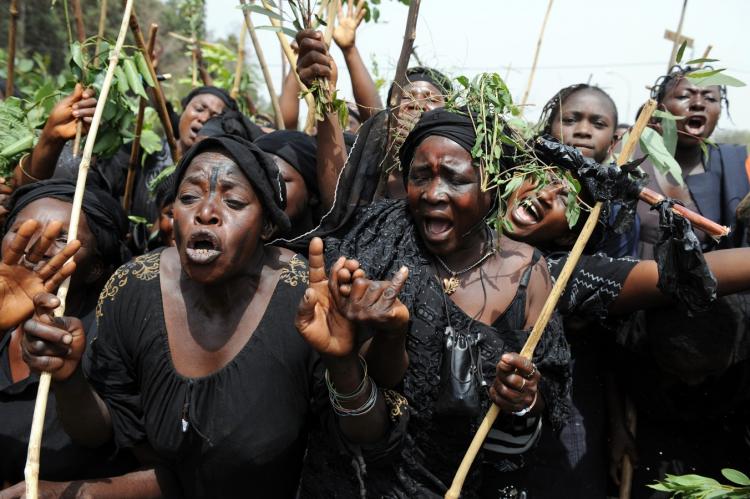Several hundred Nigerian women, dressed in black, demonstrated in Jos and Abuja against the lack of government protection during last week’s ethnic clash, in which more than hundred people, mostly children and women, were brutally slaughtered in retaliation for earlier killings.
The women marched to the Nigerian State House of Assembly and the Government House in Abuja, holding pictures depicting the horrors of the massacre. Many of the women lost children and family members in the slaughter, one woman alone lost seven children.
At Government House, they were received by Deputy Govenor Pauline Tallen who urged the women not to take the law into their own hands. There is fear the latest killings will spark another revenge, continuing the spiral of violence.
The state declared a dusk-to-dawn curfew and installed military checkpoints around Jos after the massacre in January, during which hundreds of Muslims were killed in a similar massacre.
Yet, the women say that security forces did not respond to emergency calls when the attack started. They are calling for the killers to be punished and the security guards to be replaced.
Gov. Jonah Jang told Nigerian newspaper the Daily Sun that he alerted army commanders around midnight, just after the attack began, but that it took several hours before the army arrived. By then the attackers were gone and there were dead bodies all over the street.
“They [armed gangs] had started burning the village and people were being hacked to death. I tried to locate the commanders. I couldn’t get any of them on the telephone,” Gov. Jonah Jang was reported as saying by the Daily Sun.
Maj. Gen. Maina denied the allegations and said the army “acted professionally in handling the crisis.”
Thus far, 200 people have been arrested and 49 charged with murder.
“We saw mainly those who are helpless, like small children and then the older men, who cannot run. These were the ones that were slaughtered,” a witness was reported as saying by Reuters.
Survivors say the attackers were mostly members of the Muslim Fulani clan, while the victims were mostly Christians. Nigerian media reported that the attackers would kill anybody they captured if they could not answer in Fulani.
The latest attack is believed to be a retaliation of the killings that took place in January when Christian mobs killed 300 Hause Muslims in Hai Kura Karama, south of Jos. Their bodies were disposed in wells and sewers.
The area where the massacres took place is on the border between the Muslim north and Christian south. Commentators say that this is not so much a religious clash, as it is a political and economic struggle.
Nobel Laureate, Wole Soyinka said the killings were “unwarranted, unnecessary, and amounted to lunacy,” reported the Guardian newspaper.
The women marched to the Nigerian State House of Assembly and the Government House in Abuja, holding pictures depicting the horrors of the massacre. Many of the women lost children and family members in the slaughter, one woman alone lost seven children.
At Government House, they were received by Deputy Govenor Pauline Tallen who urged the women not to take the law into their own hands. There is fear the latest killings will spark another revenge, continuing the spiral of violence.
The state declared a dusk-to-dawn curfew and installed military checkpoints around Jos after the massacre in January, during which hundreds of Muslims were killed in a similar massacre.
Yet, the women say that security forces did not respond to emergency calls when the attack started. They are calling for the killers to be punished and the security guards to be replaced.
Gov. Jonah Jang told Nigerian newspaper the Daily Sun that he alerted army commanders around midnight, just after the attack began, but that it took several hours before the army arrived. By then the attackers were gone and there were dead bodies all over the street.
“They [armed gangs] had started burning the village and people were being hacked to death. I tried to locate the commanders. I couldn’t get any of them on the telephone,” Gov. Jonah Jang was reported as saying by the Daily Sun.
Maj. Gen. Maina denied the allegations and said the army “acted professionally in handling the crisis.”
Thus far, 200 people have been arrested and 49 charged with murder.
Massacre
Just after midnight, the villagers of Dogon Nahawa, near Jos, were caught off guard when their houses were set on fire and they heard gunshots outside. In a panic, they ran out of their houses where they were cut down with machetes and knives. What followed was a horrendous two-hour bloodshed.
“We saw mainly those who are helpless, like small children and then the older men, who cannot run. These were the ones that were slaughtered,” a witness was reported as saying by Reuters.
Survivors say the attackers were mostly members of the Muslim Fulani clan, while the victims were mostly Christians. Nigerian media reported that the attackers would kill anybody they captured if they could not answer in Fulani.
The latest attack is believed to be a retaliation of the killings that took place in January when Christian mobs killed 300 Hause Muslims in Hai Kura Karama, south of Jos. Their bodies were disposed in wells and sewers.
The area where the massacres took place is on the border between the Muslim north and Christian south. Commentators say that this is not so much a religious clash, as it is a political and economic struggle.
Nobel Laureate, Wole Soyinka said the killings were “unwarranted, unnecessary, and amounted to lunacy,” reported the Guardian newspaper.






Friends Read Free